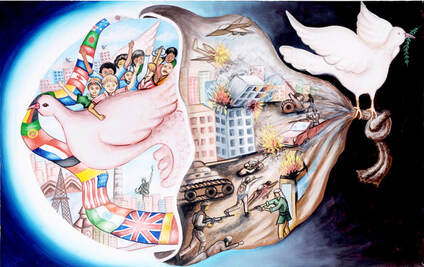
by Riane Eisler
(Excerpted and abridged from The Kosmos Journal, Spring/Summer 2014)
Can we build a more peaceful world where our great human potential for consciousness, caring, and creativity are realized? What would this more equitable, less violent world look like? How can we build it?
To answer these questions, my examination of social systems looks at the whole of humanity, including the thousands of years we call prehistory. This more complete picture makes it possible to see two historical social systems — a domination system and a partnership system.
Until just a few thousand years ago, archeological records show we lived in a partnership system. Archeology shows no signs of warfare; houses and burials do not reflect large gaps between haves and have-nots; and these earlier societies were neither patriarchies nor matriarchies, but cultures where women and men were equally valued in partnership.
However, archeology and myths since that time show a major cultural shift toward the domination system. Fortunately, over the last centuries there has been strong movement to reverse this shift in cultural direction back toward a partnership system.
One modern progressive movement after another has challenged the oppressive features of this dominator system. These include democratic challenges against: the “divinely-ordained” right of despotic kings to rule their “subjects;” the anti-colonial liberation movements that challenged the “divinely-ordained” right of one race or nation to rule over another; the women’s rights movement that has challenged the right of men to rule women and children; all the way to the environmental movement challenging man’s “divinely ordained” right to dominate and conquer nature.
Unfortunately, the focus of these progressive movements toward a more equitable and peaceful society has only been on dismantling the top of the domination pyramid. The primary relations between men and women, and between them and their daughters and sons, on which the pyramid keeps rebuilding itself, has remained largely in place. Since these relationships have been ignored, we lack the solid foundations for a peaceful and caring society.
Moving toward the partnership side of the continuum requires a more democratic organization in both the family and state or tribe, where both halves of humanity are equally valued, and stereotypically feminine values such as caring and nonviolence (which are considered “unmanly” in the domination system) are highly regarded, whether in women or men.
The relationships of women and men shapes families, education, religion, politics, and economics. The social construction of gender roles and relations also shapes a society’s guiding values.
As long as boys and men learn to equate “real masculinity” with violence and control we cannot realistically expect an end to the arms build-ups that are today bankrupting our world, and the terrorism and aggressive warfare that in our age of nuclear and chemical warfare threaten our survival.
A peaceful way of living fosters mutual respect and accountability. It uses power to empower rather than disempower others. The partnership configuration is a blueprint for a more equitable, caring, and peaceful future.
We must show that the struggle for our future is not between religion and secularism, right and left, East and West, or capitalism and socialism, but within all these societies between traditions of domination and a partnership way of life.
Every one of us can play a role in the cultural transformation from domination to partnership. Working together, we can build the foundations for a more peaceful, equitable, sustainable world, where all children can realize their capacities for consciousness, caring, and creativity — the capacities that make us fully human.
Riane Eisler is a social systems scientist, cultural historian, futurist, and attorney whose research, writing, and speaking has transformed the lives of people worldwide. She is president of the Center for Partnership Systems (CPS), and Editor-in-Chief of the Interdisciplinary Journal of Partnership Studies.
graphic: Raj Phairembam

 RSS Feed
RSS Feed
